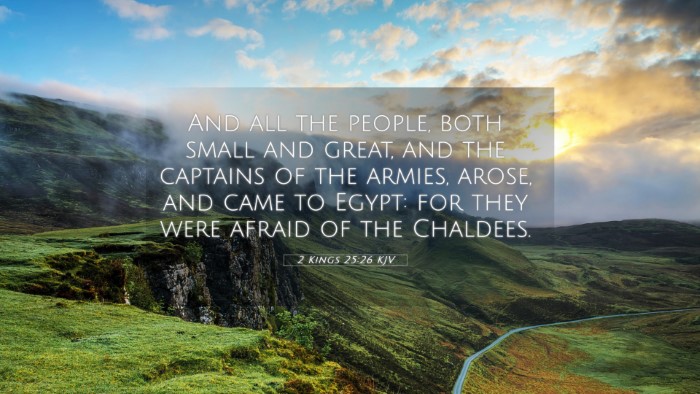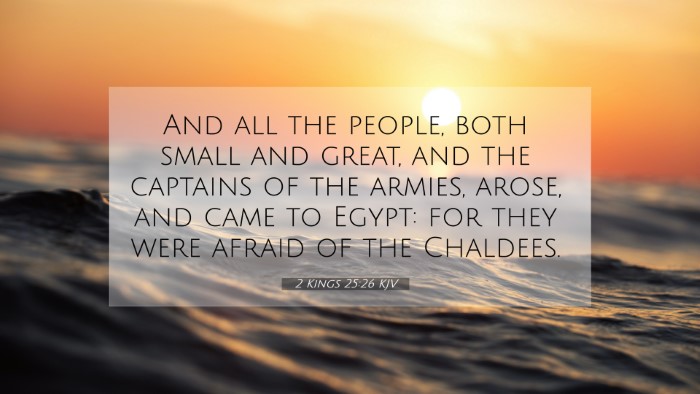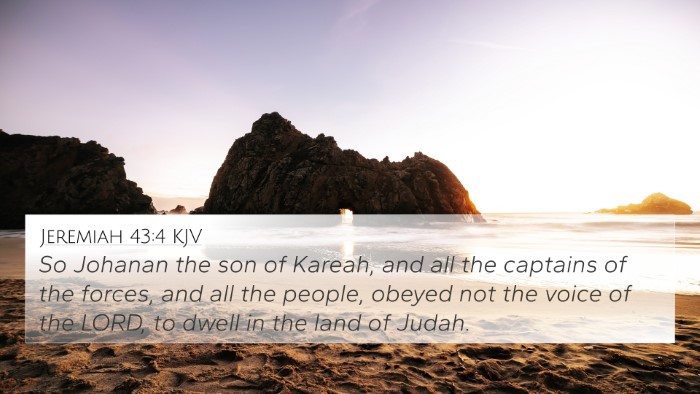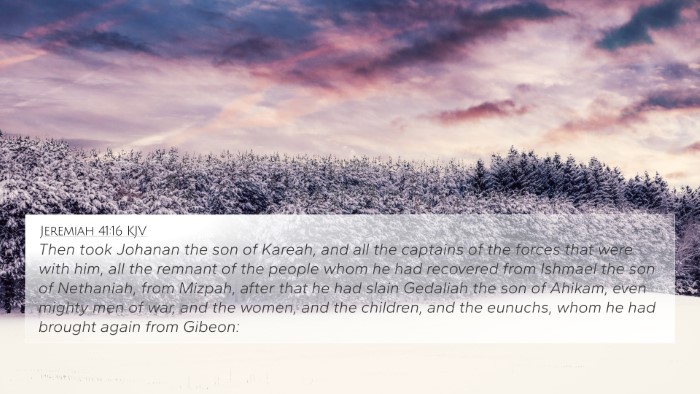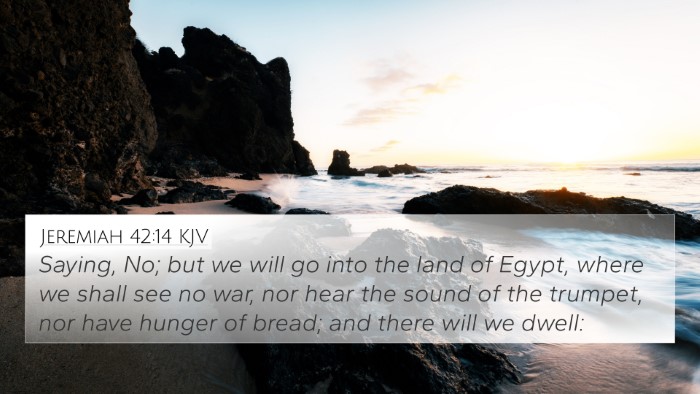Understanding 2 Kings 25:26
Verse: “And all the people, both small and great, and the captains of the armies, arose and came to Egypt; for they were afraid of the Chaldees.”
This verse captures a significant moment in the aftermath of Jerusalem's fall, where the remaining people—out of fear and despair—flee to Egypt. The verse emphasizes themes of fear, leadership, and reliance on foreign nations.
Summary of Insights
In examining this scripture, we find valuable insights reflected upon by respected biblical scholars such as Matthew Henry, Albert Barnes, and Adam Clarke. Their commentaries provide a rich tapestry of understanding that encompasses the historical, theological, and practical implications of this verse.
Contextual Overview
- Historical Setting: The capture of Jerusalem by the Chaldeans (Babylonians) was a pivotal event, leading to a mass exodus of the vulnerable populace.
- Documented Fear: The fear of the Chaldeans drove the leaders and people, indicating not just a physical but a spiritual and emotional turmoil.
- Leadership Response: The departure of the captains points to a failure in spiritual leadership, as they flee rather than seek God's counsel.
Interpretative Insights
Commentators draw several key interpretations from this verse:
- Fear and Flight: Matthew Henry notes the debilitating power of fear, suggesting that even strong leaders can succumb to panic, leading others astray.
- Seeking Refuge: Albert Barnes interprets the people's choice to flee to Egypt as symbolic of a lack of faith in Yahweh’s protection, showcasing a betrayal of trust in God.
- Transitory Security: Adam Clarke reflects on the futility of seeking safety in Egypt, likening it to a spiritual error that leads to temporary solutions with long-term repercussions.
Biblical Cross-References
This verse is connected to other scriptures that explore similar themes:
- Jeremiah 42:13-17: Here, God warns the people against fleeing to Egypt, reflecting their lack of faith.
- Isaiah 30:1-3: God rebukes Israel for seeking help from Egypt instead of trusting Him.
- Psalm 118:8: This verse highlights the idea of putting trust in God rather than in man or nations.
- Matthew 10:28: A New Testament echo of fearing those who can kill the body rather than the one who can kill both body and soul.
- Romans 8:31: If God is for us, who can be against us? This underscores reliance on divine support.
- Proverbs 29:25: Fear of man brings a snare, but trust in the Lord brings security.
- Isaiah 31:1: Another passage cautioning against relying on Egypt for safety and support during trials.
Thematic Connections
The themes of fear, reliance on God versus man, and the consequences of disobedience echo throughout scripture. The verse can serve as a reminder of the importance of steadfast faith in turbulent times. As we study these connections through a comprehensive Bible cross-reference guide, we understand the cohesive narrative God presents through His word.
Tools for Deepening Understanding
To further explore the connections between Bible verses, several tools are available:
- Bible Concordance: A valuable resource for finding words and phrases to locate related scriptures.
- Cross-Reference Bible Study: Methods that help link verses thematically or contextually.
- Bible Reference Resources: Various guides and tools to assist in comprehensive scripture analysis.
Application and Reflection
As contemporary readers, we can reflect on the inclination to seek refuge in worldly solutions during crises. This verse teaches us to identify our fears and where we place our trust. By understanding the theological implications of turning to God instead of man, we cultivate a deeper faith and reliance on divine providence.
Conclusion
2 Kings 25:26 serves as a solemn reminder of the consequences that arise from fear-driven decisions. Through cross-referencing various biblical texts and utilizing extensive biblical study methods, believers can uncover deeper truths. Embracing God’s promise to guide and support His people ultimately leads to a more profound understanding of His faithfulness, shaping our lives in alignment with His divine will.

